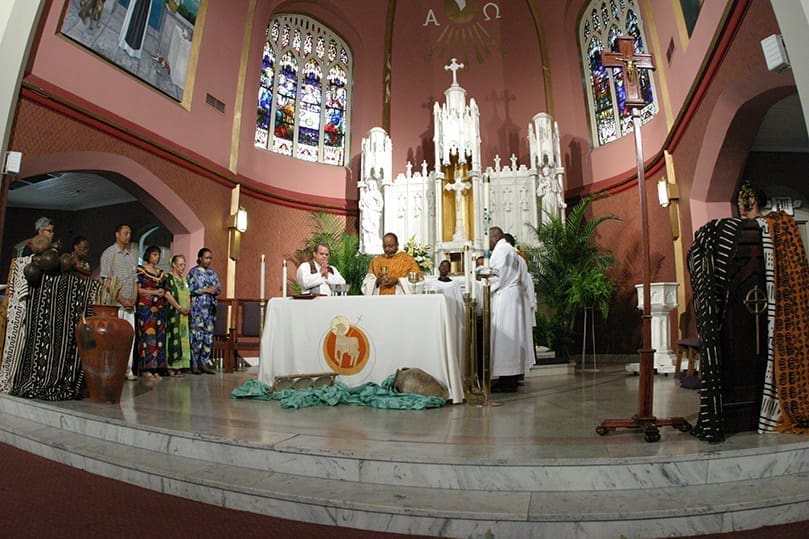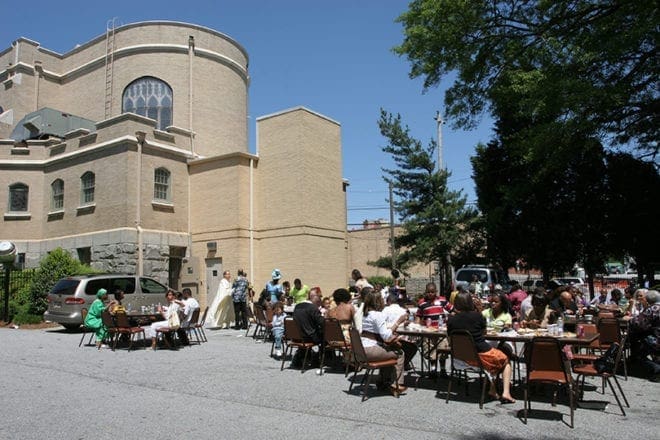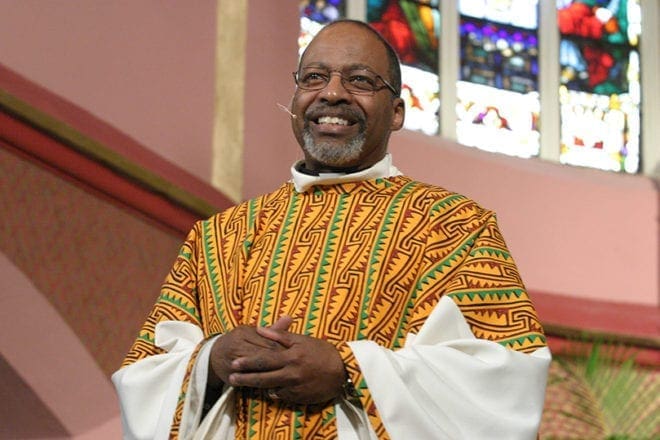 Photo By Michael Alexander
Photo By Michael AlexanderAtlanta
West End Parish Celebrates Roots In Light Of Gospel
By ANDREW NELSON, Staff Writer | Published May 7, 2009
Women dancers wearing feathered headdresses led altar servers, deacons and priests at St. Anthony of Padua Church Sunday as drummers beat a rhythm to open the morning Mass.
Since 1999, the West End parish has annually highlighted its diversity of people of African heritage with its African, African-American Cultural Celebration.
The faithful dressed in colorful clothing and the altar and sanctuary were adorned with symbols of Africa on Sunday, April 26.
“If we aren’t truly ourselves, we cannot effectively witness the resurrection,” said Father Edward Branch, who was the guest celebrant.
Nearly 300 people crowded the wooden pews of the church for the yearly celebration.
People said the parish is strengthened as its members experience the variety of cultural traditions. Last year, more than eight African countries were represented.
Kawalie Fataki, a native of the Democratic Republic of Congo, dressed in a brown “che grukiba bazin” as it is known. He described the flowing native outfit as “beyond black tie” in his homeland, worn by kings and presidents. Fataki, a language teacher in the Atlanta public schools and at local colleges, was the lector, reading an account of the early church in the Acts of the Apostles and a portion of a letter from St. John. On other Sundays, Fataki can be found guiding the congregation as a worship leader, choir member or in other ministries.
“It is like a fountain where we are strengthened. We come to get our spirit and humanity strengthened. Our thirst for the Spirit is quenched,” he said about the celebration.

Parishioners and guests gather outside for food and music following the April 26 Mass. Photo By Michael Alexander
It is a pleasure to see a variety of cultures at Mass because “each culture represents a facet of God, our Father,” said Fataki.
The organizers put on such a wonderful exhibit of culture that it challenges parishioners to contribute the best of their native countries, he said.
Father Branch, the chaplain at Lyke House, the Catholic community at Atlanta University, said in his homily that just celebrating African heritage isn’t enough. He said people’s Christian values must also be lived within African cultures.
“Culture is not the Gospel,” he said.
Quoting Pope John Paul II, Father Branch said the church realizes culture is an essential element in sharing the Gospel. And the church must reflect the different traditions and cultures of its members to effectively spread Jesus’ message, he said.
However, Christianity moves people beyond their own cultures, he said. Father Branch recited the conflicts of the 20th century caused by people who put their group identities above their duties as Christians. It happened many times, from the wars in the Balkans between different Christians to Rwanda’s genocide between tribes in a predominantly Catholic country, he said.
People substitute Christianity with group survival when the group identity is put ahead of God’s plans, Father Branch said, adding that being part of a group can seem easier.
“Culture is not Christ,” he said. “Culture is not the Gospel. It is the Gospel that tells us to learn about each other. It is Christianity that tells us our gifts are for the benefit of all.”

Father Edward Branch, the main celebrant and homilist for the 10th annual African-African American Celebration, delivers his homily before the congregation. Father Branch was the first celebrant for the event back in 1999. He is the chaplain at Lyke House, the Catholic Center at Atlanta University. Photo By Michael Alexander
Culture’s role is to “carry” Christ, he said.
The cultural tradition at the parish started as a way to bring people together.
Father Tim Gadziala, the pastor, said the event is important both for African-Americans to learn about their roots and for newly arrived African immigrants to see the similarities they have with Africans from different countries.
“Their diversity is celebrated and becomes a source of unity both in St. Anthony and the archdiocese,” said Father Gadziala.
The parish welcomes newcomers. It hosts a Mass in the Igbo language every month for Nigerian immigrants. The service attracts as many as 100 families, said Father Gadziala, who after the Mass changed into a light yellow African suit he bought during a recent trip to Zimbabwe.
Artist Chuck Douglas said he once saw a gap between the African-American community at the parish and immigrants from Africa. At the time there wasn’t much linking the two communities and he came up with the idea for the event to help people build bridges.
The event is now one of the highlights of the parish’s calendar. The worship brings people together as does the sharing of food. Under a cloudless sky, the worshippers lunched on black-eyed peas, jambalaya, an African casserole with prunes, among other treats.
“We discovered more similarities than differences. And we share the same ancestors,” Douglas said. “We joyously celebrate with our brothers and sisters.”